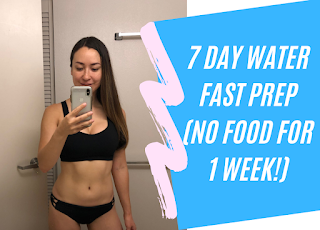I Lost 8% of My Body Weight on a 38 Day Water Fast
After reading all the 38 day water fasting success stories, I decided to give it a try myself and see if I could lose weight while also gaining health benefits. To my surprise, I lost 8% of my body weight after only 38 days! Here’s what happened...
What is water fasting?
When it comes to water fasting, my approach is simple: Eat nothing but non-caloric beverages for a certain period of time. In general, I like to keep my fasts under 40 days. That said, some people are able to maintain or lose weight on longer fasts and that’s fantastic. The longer you fast, however, there’s an increased risk for any adverse side effects such as nutrient deficiencies or hormonal issues so it’s important you do your research and/or consult with your physician before trying anything like long-term fasting.
The risks of fasting
While I experienced zero medical problems during my water fast, you may experience something entirely different. Fasting is not safe for everyone and is known to cause serious complications if done improperly. Water fasting can lead to malnourishment and dehydration, two things you want to avoid when looking to lose weight. A health care professional should be consulted before embarking on any type of fast lasting longer than 3 days. Water fasting is not recommended unless you have no other option; proper nutrient intake should always be your top priority when attempting to improve your diet or lose weight. Exercising extreme caution while undertaking such an endeavor will help ensure that it goes as smoothly as possible.
Why would anyone want to do this in the first place?
For many, a water fast is simply an extreme weight-loss method. In reality, however, it’s more than that: It’s also a great way to detox your body and kick-start your metabolism. If you’re trying to lose weight but struggling with health issues like high blood pressure or hypothyroidism, we suggest speaking with your doctor before attempting a water fast—if you aren’t already overweight or obese (see our description below). But if your doctors give you the go-ahead, they should also be able to help you design an effective plan for how long you should attempt the fast and how quickly (or slowly) you should ease back into food when it ends.
Fasting for spiritual reasons (its roots)
Every major religion in existence has some form of fasting ritual. In Christianity, Catholics may abstain from eating meat on Fridays, while followers of Islam refrain from food and drink during daylight hours throughout Ramadan. Jews fast by choosing not to eat or drink anything between sundown and sunup for 25 hours each week (that’s right—7 days!) as part of their Yom Kippur observance. And during Holy Week in Christian communities around Mexico, worshippers abstain from meat as well as any other impure thing (e.g., sex) for 40 days after Easter Sunday. Why do they do it?
Fasting as a part of religious practice
Fasting has long been observed as a spiritual practice. Jesus, for example, fasted 40 days in the desert before being tempted by Satan. Muslims observe fasting during Ramadan—which lasts for about 30 days—as one of their Five Pillars of Faith. There are also Christian and Hindu fasts tied to certain times of year, called Lent and Mahashivratri respectively. And outside these religious practices, though not universally observed, many people have adopted intermittent fasting as an aid to weight loss (and is it ever effective!) or overall health. In fact, one review found that fasting was more effective than traditional diets at reducing body weight.
The idea behind fasting today
When humans evolved they had no idea that they’d be sitting in front of a computer screen eight hours a day. Evolution doesn’t keep up with modern advances very well. Our bodies are designed to handle days-long fasts and months-long spans without food. And yet, for most people living in America today, food is available every hour, around the clock.
What are the benefits of fasting?
Fasting has many health benefits. A fast doesn’t just mean abstaining from food; it also includes abstaining from television, alcohol, and other recreational activities you enjoy. By doing so, you’ll see that your mood and energy levels increase. You’ll also be surprised by how much time you can save in addition to shedding pounds more quickly and efficiently than with other weight loss plans.
Intermittent fasting vs. other popular diets
People following an intermittent fasting diet may lose weight differently than those who follow other popular diets. Intermittent fasting dieters lost between 2.6 and 3.9 percent of their body weight in 38 days, compared to people following Paleo, who lost about 6 percent in 18 days, and those following Dukan, which resulted in about a 1 percent loss in 20 days. This might seem like a small difference—and it is—but if you’re trying to lose weight, every little bit counts! And don’t forget that most experts agree that you should be losing no more than two pounds per week. So losing less can actually help keep your results from slowing down over time. Of course, even a couple pounds is great news when you’re trying to lose weight safely. The important thing is making sure your plan works for you and sticking with it for at least six months before deciding whether or not it was worth your time.





0 comments:
Post a Comment